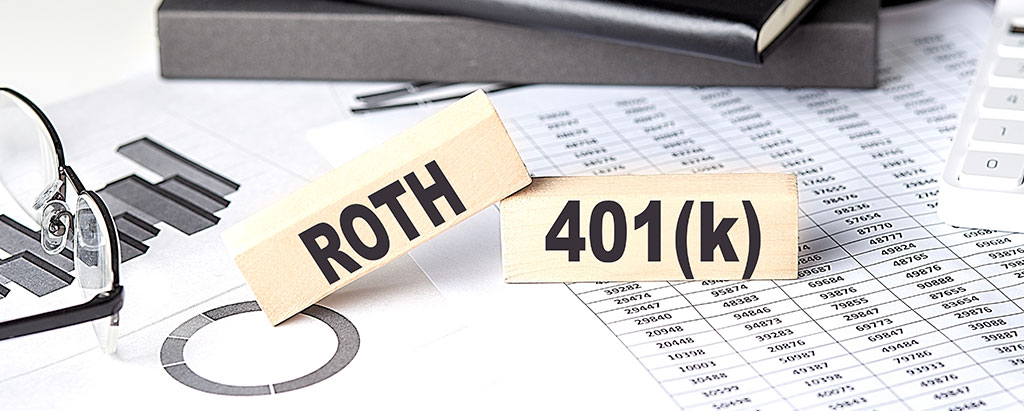
The Roth 401(k) is gaining in popularity due to employers offering it inside their plans and also thanks to provisions in the Secure Act 2.0 that only pertain to the Roth option.
The question is, is it right for everyone?
Read on to see if the Roth 401(k) is the right choice for you.
How the Roth 401(k) Works

The Roth 401(k) is a type of 401(k) that you fund just like a traditional 401(k).
The key difference is that you either get a tax break today with the traditional 401(k), or tax-free withdrawals in retirement with the Roth 401(k) since your contributions are made with after-tax dollars today.
2024 Contribution Limits for Roth 401(k)s

The contribution limits for Roth 401(k)s are the same as a traditional 401(k).
You can contribute $23,000 in 2024 with a catch-up contribution of $7,500 for those 50 or older ($30,500).
[Related Read: Retirement Plan Contribution Limits for 2024]
The Downside to the Roth 401(k)

Many CPAs try to get you to contribute to the traditional 401(k) each year, so you get the biggest tax break on your taxes.
If you contribute to the Roth 401(k), you won’t get a tax break since contributions are made with after-tax dollars.
Whether or not this is a downside ultimately comes down to the individual.
Some people need a tax break today, while others aren’t concerned with it and would rather have their retirement be tax-free.
Other Considerations for a Roth 401(k)

Not every employer offers the Roth 401(k) provision.
If your employer does offer the Roth 401(k) provision, you’ll need to read your plan carefully to understand the terms.
Some employer 401(k) plans allow employees to split contributions between a traditional 401(k) and a Roth 401(k).
If split contributions are allowed, it is up to the individual to determine which percentage is best for their personal financial situation.
Contact your HR or your plan administrator if you are unsure of the rules of your plan.
How the Secure Act 2.0 Affects Roth 401(k)

The Roth 401(k) plays a bigger role with the Secure Act 2.0 provisions.
There are 3 main Secure Act 2.0 provisions that affect Roth 401(k)s.
The first provision started in 2024.
It allows employee plan sponsors to create emergency savings accounts for participants, who could then make Roth pay-ins (on an after-tax basis) to that savings account within the 401k plan.
The rules state that your savings account balance cannot exceed $2,500 and you can only take up to one withdrawal per month.
Also, the first 4 withdrawals in a year must be penalty-free.
If you take more than four withdrawals in a year, your employer may impose fees, but you’ll still have access to your money.
Your employer may also automatically enroll you in the emergency savings account, setting aside up to 3% of your compensation.
An added bonus is that contributions to this emergency savings account qualify for matching contributions to your 401(k).
If you leave the company, the funds may be converted into a Roth investment account or withdrawn because your contributions are always yours to keep.
The second provision for the Roth 401(k) in the Secure Act 2.0 allows employers to make matching contributions directly to employees’ Roth 401(k)s.
This change took effect instantly upon the Secure Act 2.0’s passage, but it’s important to note that this option is discretionary, and employers may choose to make pre-tax matches or not provide a company match at all.
The third Secure Act 2.0 provision caused all sorts of noise when it was announced because the new rule states that 401(k) investors who make more than $145,000 must now make “catch-up” contributions to an after-tax Roth 401(k) account instead of a traditional pre-tax 401(k).
This new rule was set to start in 2024, but a recent announcement from the IRS has pushed back the deadline for this rule change to 2026, giving companies more time to adjust and investors to plan.
[Related Read: SECURE Act 2.0: How It Affects Your Retirement Savings]
RMDs and Roth 401(k)s

Traditional 401(k)s require investors to take RMDs.
But, starting in 2024, investors with a Roth 401(k) or Roth 403(b) will no longer need to take RMDs.
Early Withdrawal Rules of a Roth 401(k)

If you withdraw funds from a traditional 401(k) before you turn 59½, you could owe taxes plus a 10% penalty on the amount withdrawn.
With a Roth 401(k), there are no taxes or penalties on early withdrawal of your contributions as long as the account is at least 5 years old.
However, you may owe taxes and a penalty on earnings that are withdrawn before age 59½.
Roth 401(k)s and Inheritance

Heirs who inherit a Roth 401(k) have different tax treatment than those who inherit a traditional 401(k).
If the account is a Roth 401(k), then you won’t owe any income taxes, unlike an inherited traditional 401(k).
Since the traditional 401(k) is funded pre-tax, you’ll pay taxes at ordinary income rates.
According to the IRS, “Withdrawals of contributions from an inherited Roth are tax free. Most withdrawals of earnings from an inherited Roth IRA account are also tax-free. However, withdrawals of earnings may be subject to income tax if the Roth account is less than 5-years old at the time of the withdrawal.”¹
[Related Read: Pros and Cons of a Roth 401(k): Key Differences and Tax Implications]
If you have questions about your 401(k) or if you need help, we’re here for you. Click below to book a complimentary 15-minute 401(k) Strategy Session.
SOURCES
.fb-background-color {
background: !important;
}
.fb_iframe_widget_fluid_desktop iframe {
width: 1100px !important;
}















